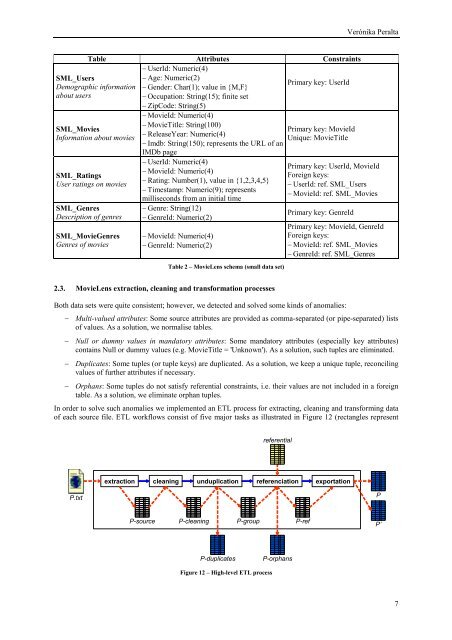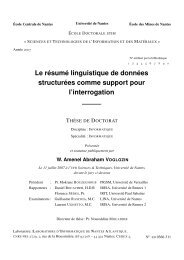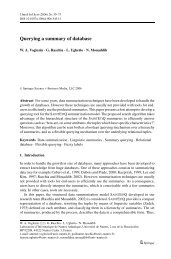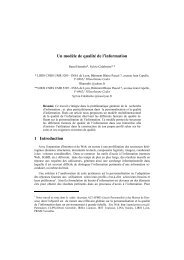Extraction and Integration of MovieLens and IMDb Data - APMD
Extraction and Integration of MovieLens and IMDb Data - APMD
Extraction and Integration of MovieLens and IMDb Data - APMD
You also want an ePaper? Increase the reach of your titles
YUMPU automatically turns print PDFs into web optimized ePapers that Google loves.
Table Attributes Constraints<br />
SML_Users<br />
Demographic information<br />
about users<br />
SML_Movies<br />
Information about movies<br />
SML_Ratings<br />
User ratings on movies<br />
SML_Genres<br />
Description <strong>of</strong> genres<br />
SML_MovieGenres<br />
Genres <strong>of</strong> movies<br />
− UserId: Numeric(4)<br />
− Age: Numeric(2)<br />
− Gender: Char(1); value in {M,F}<br />
− Occupation: String(15); finite set<br />
− ZipCode: String(5)<br />
− MovieId: Numeric(4)<br />
− MovieTitle: String(100)<br />
− ReleaseYear: Numeric(4)<br />
− Imdb: String(150); represents the URL <strong>of</strong> an<br />
<strong>IMDb</strong> page<br />
− UserId: Numeric(4)<br />
− MovieId: Numeric(4)<br />
− Rating: Number(1), value in {1,2,3,4,5}<br />
− Timestamp: Numeric(9); represents<br />
milliseconds from an initial time<br />
− Genre: String(12)<br />
− GenreId: Numeric(2)<br />
− MovieId: Numeric(4)<br />
− GenreId: Numeric(2)<br />
Table 2 – <strong>MovieLens</strong> schema (small data set)<br />
2.3. <strong>MovieLens</strong> extraction, cleaning <strong>and</strong> transformation processes<br />
Primary key: UserId<br />
Primary key: MovieId<br />
Unique: MovieTitle<br />
Verónika Peralta<br />
Primary key: UserId, MovieId<br />
Foreign keys:<br />
− UserId: ref. SML_Users<br />
− MovieId: ref. SML_Movies<br />
Primary key: GenreId<br />
Primary key: MovieId, GenreId<br />
Foreign keys:<br />
− MovieId: ref. SML_Movies<br />
− GenreId: ref. SML_Genres<br />
Both data sets were quite consistent; however, we detected <strong>and</strong> solved some kinds <strong>of</strong> anomalies:<br />
− Multi-valued attributes: Some source attributes are provided as comma-separated (or pipe-separated) lists<br />
<strong>of</strong> values. As a solution, we normalise tables.<br />
− Null or dummy values in m<strong>and</strong>atory attributes: Some m<strong>and</strong>atory attributes (especially key attributes)<br />
contains Null or dummy values (e.g. MovieTitle = 'Unknown'). As a solution, such tuples are eliminated.<br />
− Duplicates: Some tuples (or tuple keys) are duplicated. As a solution, we keep a unique tuple, reconciling<br />
values <strong>of</strong> further attributes if necessary.<br />
− Orphans: Some tuples do not satisfy referential constraints, i.e. their values are not included in a foreign<br />
table. As a solution, we eliminate orphan tuples.<br />
In order to solve such anomalies we implemented an ETL process for extracting, cleaning <strong>and</strong> transforming data<br />
<strong>of</strong> each source file. ETL workflows consist <strong>of</strong> five major tasks as illustrated in Figure 12 (rectangles represent<br />
P.txt<br />
extraction<br />
P-source<br />
cleaning<br />
P-cleaning<br />
unduplication<br />
P-group<br />
referenciation<br />
P-duplicates P-orphans<br />
Figure 12 – High-level ETL process<br />
referential<br />
P-ref<br />
exportation<br />
P<br />
P’<br />
7







